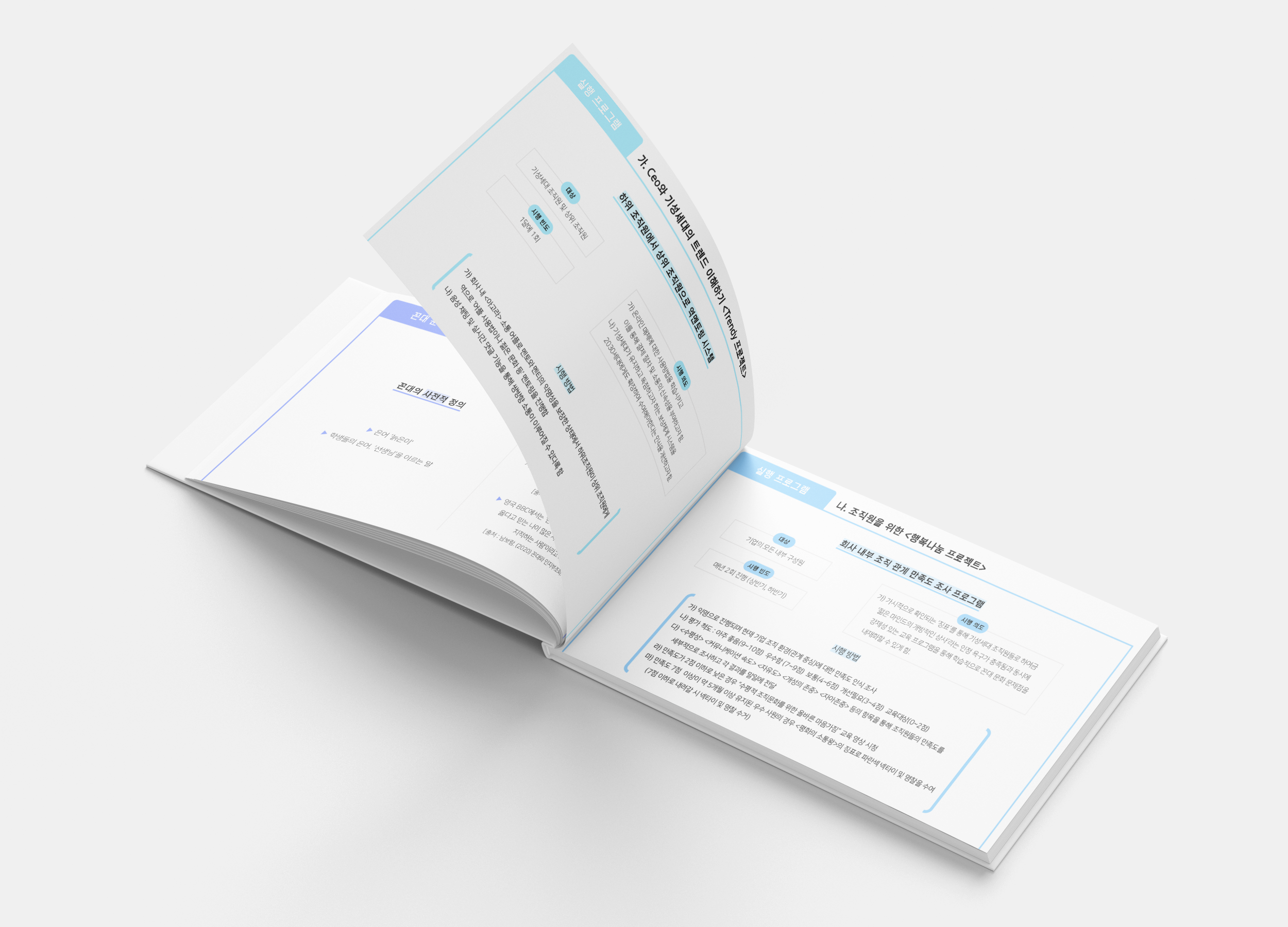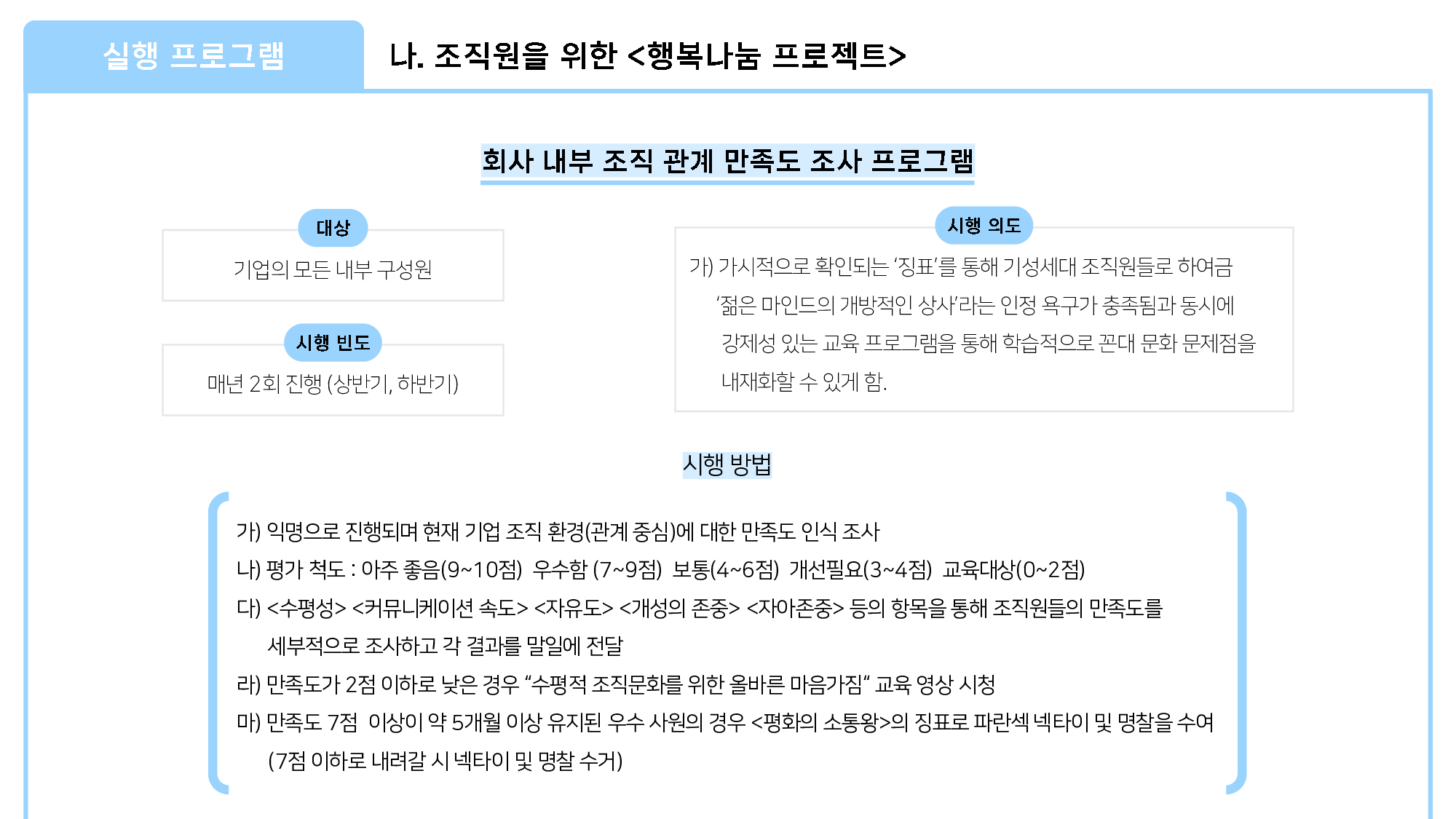
Improving Corporate Culture to Overcome ‘Ubervisor’ Mentality Campaign
<Public Relations Strategies> in Seoul Women’s University, 2021
As part of the <PR Strategies> class, this project proposes a campaign to improve Korea's hierarchical and vertical corporate culture.
This project, titled "Improving Corporate Culture to Overcome 'Ubervisor' Mentality Campaign," is focused on addressing and reforming the traditional, hierarchical, and rigid corporate culture commonly referred to as 'Ggondae(Ubervisor) Culture' in Korean companies. It involves a comprehensive analysis of both internal organizational characteristics and external environmental factors. The campaign proposes innovative PR strategies, including the analysing situation and target, aimed at fostering a more inclusive, communicative, and flat organizational structure. These strategies target the 40-50 age demographic within the workforce, aiming to bridge generational gaps, enhance communication, and ultimately improve organizational culture by reducing authoritative and top-down management styles.
In this project, the analysis of the problem situation and key audiences deeply explores the structural and cultural issues within Korean corporations, thereby investigating the social and historical backdrop that underpins the 'Ubervisor(Ggondae) Culture.'
Firstly, the situation analysis commenced with an understanding of the collectivist social structure in Korea. The Ubervisor Culture has been formed within contexts such as the agricultural society, where the necessity for collective labour was emphasised. This background instills a strong tendency towards collectivism among Koreans, as suggested by Geert Hofstede's cultural dimensions theory. The workplace culture in Korea is characterized by competitive and hierarchical ethics, stemming from a mix of Confucian and military influences, which accentuate respect for authority, obedience to elders, and conformity. Such an environment limits upward communication and enforces top-down decision-making, hindering open dialogue and innovation. Organisations are distinguished by a clear class structure, from new employees to CEOs. Although some companies have attempted reforms, such as flattening hierarchies and promoting more open communication, these efforts often face challenges in changing deeply entrenched cultural norms.
As the primary audience, the 40-50 age demographic was selected and analysed with focus. Individuals in the 40-50 age, often occupying middle to upper management roles, were identified as a group capable of both maintaining and transforming the Ubervisor Culture. Their experiences of Korea's rapid industrialisation and democratisation have shaped a strong perception of hierarchy and authoritarianism within workplace relationships. Through the analysis of key audiences, it was discovered that this age group exerts a significant influence on workplace culture and communication styles. There exists an inherent conflict between their traditional views and the younger generation's need for a more collaborative and flexible working environment.
The project proposed strategies targeted at this key demographic group, focusing on education, communication, and organisational change. By addressing the root causes of the Ubervisor Culture, such as the absence of open communication and rigid hierarchical structures, the aim was to foster a more inclusive, dynamic, and progressive corporate culture. This involved introducing initiatives to enhance understanding across generations, encouraging more horizontal communication, and recognising the need for cultural and structural changes to meet the evolving expectations of the workplace.
The campaign outlined in this project focused on transforming the entrenched Ubervisor Culture within Korean corporations by fostering communication, understanding, and collaboration among different generations within the organisation. The PR objectives and execution programmes were centred on this aim.
The PR objective was to cultivate an open communication culture that narrows the gap between the 40-50 age demographic ('Ubervisor' generation) and the younger generations within the organisation. Secondly, it was to educate and encourage members to comprehend and embrace current trends and the perspectives of younger employees, thereby mitigating hierarchical and authoritative communication styles. Moreover, to realise a more inclusive, dynamic, and progressive corporate culture that values horizontal communication and mutual respect among all employees.
The PR programmes were designed to challenge and gradually dismantle the Ubervisor Culture, promoting a transition towards a more flexible, transparent, and collaborative workplace culture. By addressing the fundamental causes of communication barriers and hierarchical rigidity, the campaign aimed to create a forward-thinking environment that respects and values the contributions of all employees, regardless of age or position.
Through this project, I gained insights into strategic analysis and audience identification. The foundational step in PR is to understand the situation and identify the target audience. This project has illuminated the importance of analysing cultural and historical contexts to craft strategies that resonate with the audience. Additionally, I learned the effectiveness of employing communication and engagement strategies. The project highlighted how employing various targeted communication and engagement strategies can effectively address specific barriers to change. These initiatives have made me realise the application of strategic communication in fostering open dialogue, empathy, and inclusiveness.
In summary, this project taught me the critical role of strategic analysis, audience targeting, innovative communication approaches, and the willingness to challenge cultural norms in driving successful PR campaigns.
Project Outcome
You can see the learning outcome through this file. Unfortunately, only the Korean version is available.













